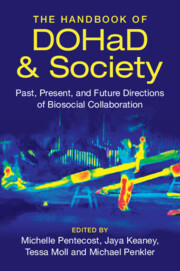Contents
Section 5The Biosocial in Practice
20Understanding Child Development: A Biosocial Anthropological Approach to Early Life
21Building Biosocial Collaboration in the HeLTI–South Africa Trial
23Narrative Choreographies: DOHaD, Social Justice, and Health Equity
24Interdependence: Reworking Ontogeny through Tendrel Fishbones and Dirty Chickens
25Modelling in DOHaD: Challenges and Opportunities in the Era of Big Data
26The Promise of Reversibility in Neuroepigenetics Research on Traumatic Memories
27Disability in DOHaD and Epigenetics: Towards Inclusive Practice
28Creating Good Data Our Way: An Indigenous Lens for Epidemiology and Intergenerational Health
29DOHaD in the Anthropocene: Taking Responsibility for Anthropogenic Biologies

